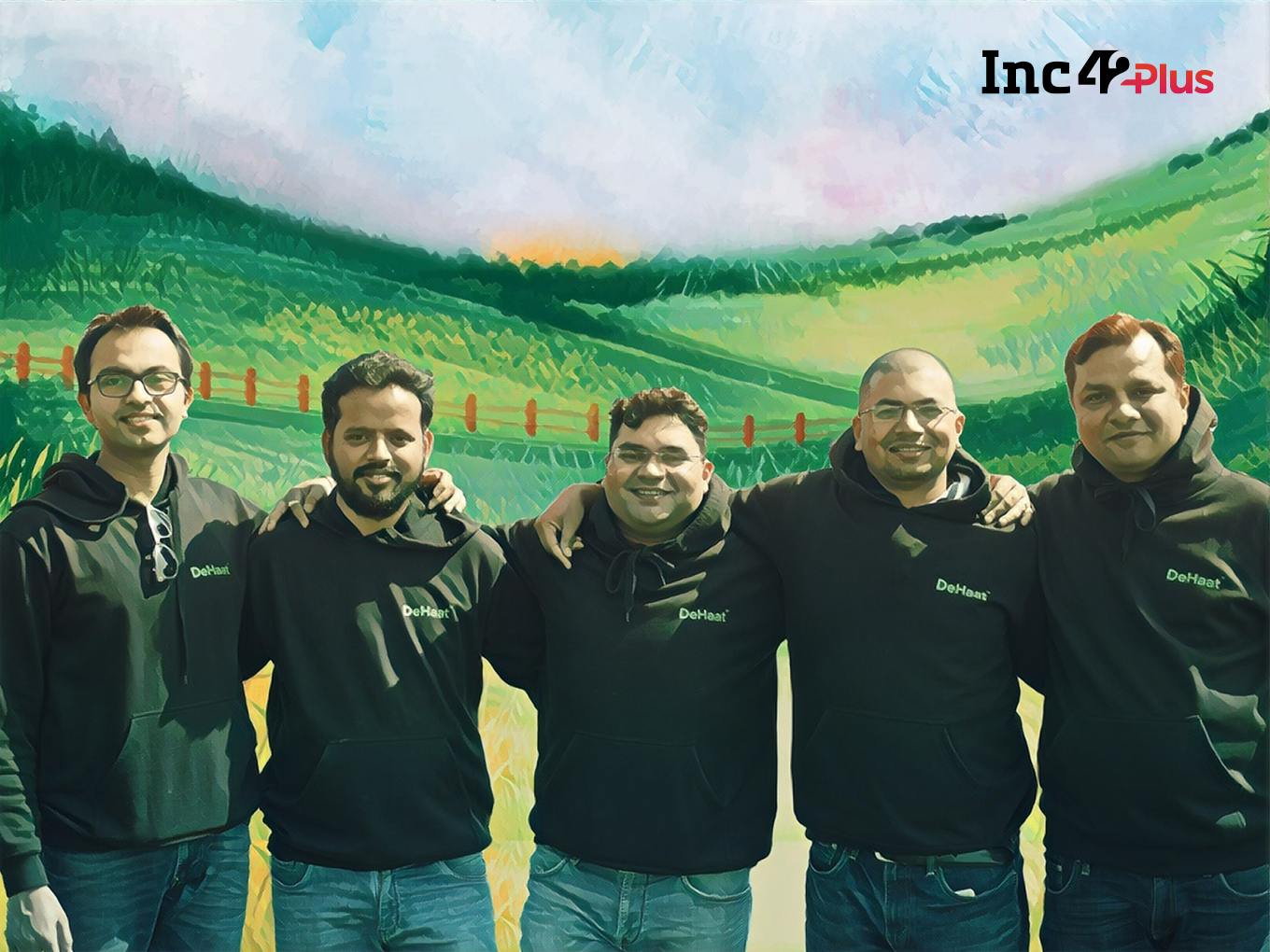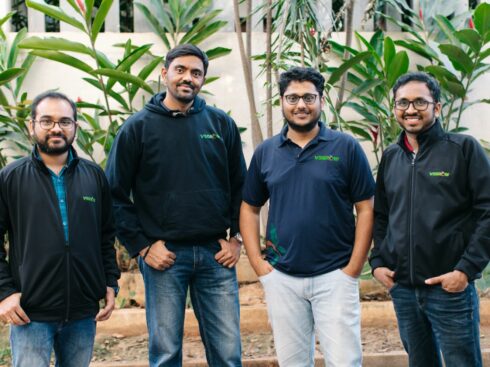SUMMARY
In India, the most reliable channels for input and output are quite far from villages, and that is where farmers lose efficiency. Through its last-mile network of 1,362 local micro-entrepreneurs, DeHaat is trying to bring all agri-services under one roof
The startup saw a 3.5 times jump in revenue, from INR 43 crore in FY2018-19 to INR 135 Cr in FY2019-20
Apart from the market-linkage startups which have gained investors’ interest, many startups operating in agri-inputs, FaaS, financing and other segments are aiming to build full-stack platforms to make the unit economics work. Can DeHaat's unique ‘micro-entrepreneur model’ give it an edge?
Farming 3.0: India’s Mission Agritech
Once least favoured, agritech is today betted as one of the most resilient sectors. The pandemic has further pushed farmers to leverage technology offered by the startups in the space, thereby making the sector a hotspot of investments. Is India’s agritech on the brink of a permanent transformation or the newly-found success a passing cloud? This playbook explores!
India has more than 100 Mn farmers who are still struggling to access essential services such as agri-finance, the supply of agri inputs like seeds, fertilisers and farm equipment, and easy market access, mostly provided by agricultural value chains. On the other hand, several agribusinesses are unable to sell their inputs directly to farmers or procure farm produce from them without going through multiple agents due to a complex, multilayer supply chain. The lack of market access is one of the key reasons why farmers, who constitute 60% of the Indian population and contribute nearly 18% to the country’s GDP, are still miles away from ‘sustainable agriculture’.
Shashank Kumar, cofounder and CEO of DeHaat (registered as Green Agrevolution) who hails from a farmer’s family, had been exposed to these business gaps all too often when he was growing up. And the outcomes deeply disturbed him. After graduating from IIT-Delhi, he joined a management consulting firm where he worked in the supply chain space. But after some time, Kumar decided to leverage his knowledge of technology and supply chain to mend and strengthen a broken format.
So, DeHaat was built in 2012 in a bid to offer full-stack agricultural services.
It did not remain a solo venture for long. Kumar was joined by other founding members, Shyam Sundar Singh (executive director), Amrendra Singh (director, input services), Adarsh Srivastava (director, fruits and vegetables) and Abhishek Dokania (director, output operations). They all had one common goal: They wanted to streamline the fragmented agricultural inputs channels (read retail shops and co-operatives); bring to farmer quality agri-inputs such as seeds, fertilisers, crop protection chemicals and equipment, at a reasonable price; provide market access to them; act as advisors and offer multiple services as the company grew.
The founders had also realised early on that leveraging new-age technology was the only way forward to resolve this crucial challenge faced by farmers. However, the journey ahead was not going to be easy for two key reasons. One, agritech was not an easy business to scale, nor was it a favourite sector for venture capitalists in India. Two, digital maturity was still low in villages.
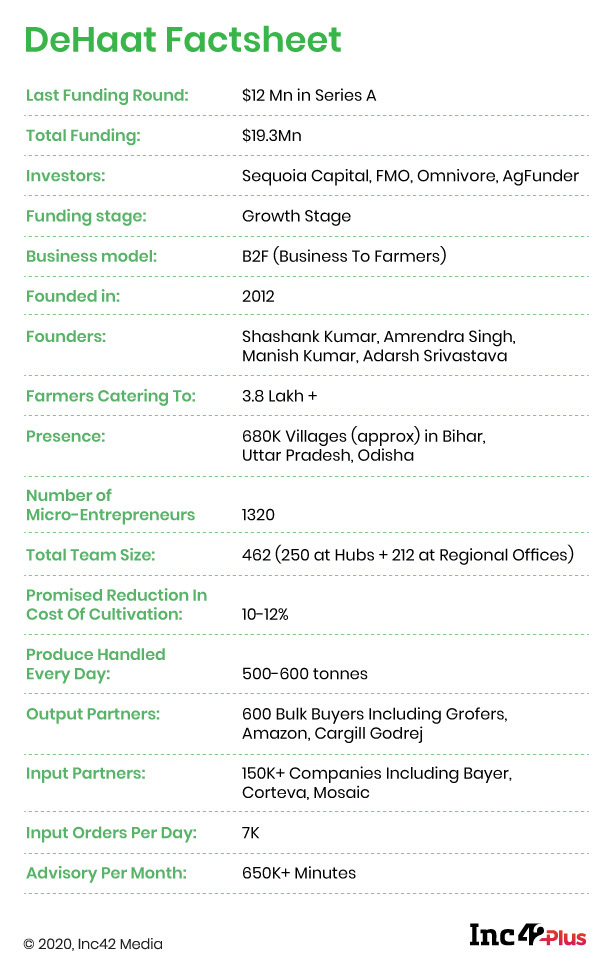
So, it was not surprising that DeHaat got its first round of angel funding, around $80K, in February 2015, three years after the company was set up. Until then, it could only raise a seed capital of $20K.
The startup has come a long way since those days. It is now backed by leading investors such as Omnivore, Sequoia Capital India, AgFunder and the Netherlands-based FMO Entrepreneurial Development Bank. Moreover, it is one of the very few startups which offer multiple services, including agri inputs aggregation, access to the market through bulk buyers and farm advisory. It has recently entered the agri-fintech space and aims to become a full-stack service platform. “We are quite confident about growth from here on,” says Kumar.
In April 2020, the Patna-based agritech startup raised $12 Mn in Series A, led by venture capital firm Sequoia Capital India and the Dutch development bank, FMO. DeHaat also saw a 3.5x jump in revenue, from INR 43 crore in FY2018-19 to INR 135 Cr in FY2019-20.
How DeHaat’S Micro-Entrepreneur Model Helped It Achieve Scale
What is the secret of DeHaat’s sustainable growth when many of its peers are still struggling even in niche segments, unlike the bigger, and riskier, agri-services platform? Looking back at the journey, Kumar thinks its micro-entrepreneur model has been a game-changer, which enables last-mile delivery of 360-degree agricultural services to farmers.
But there were many hurdles on the way.
Although DeHaat had unveiled a new vision towards the right direction, convincing the farmers to adopt new farming practices and agricultural inputs was a tough challenge. Add to that low smartphone penetration across rural India, and the unavailability of reliable data about input consumption and cropping patterns, and things got murkier. The key was to reach out to farmers in a way that would make them comfortable. Even though Kumar comes from a farmer’s family, DeHaat’s employees were considered outsiders and the trust factor had to be built upon. Plus, the logistics required for input distribution and output (agri produce for sale) collection had to be simplified.
That is when the idea of micro-entrepreneurs clicked. DeHaat pressed into service local representatives or micro-entrepreneurs who would act as a bridge between the platform and the farmers through a hub-and-spoke model.
For instance, institutional input providers such as Bayer India deliver fertilisers, seeds and the likes to a warehouse/cold storage (hub) owned by DeHaat. The startup’s staff members then ferry the inputs to DeHaat centres (spokes), owned by the micro-entrepreneurs. These entrepreneurs take care of the last-mile delivery, covering 600-800 farmers within a catchment area of 3-5 km.
Similarly, when these farmers bring their produce to the allotted spoke, a micro-entrepreneur will collect the same. DeHaat would use third-party logistics services to pick it up from the spoke (DeHaat centre), aggregate the output and stock it at a warehouse or cold storage, located within 100 km from the spoke. Finally, this will be sourced by institutional buyers such as Grofers, Amazon, Cargill Godrej and others and taken to retails or customers. The warehouse or cold storage is managed by 10-15 DeHaat employees who have experience in supply chain and warehouse management. “At times, we engage third-party warehouse services, but that is only for quality control,” says Kumar.
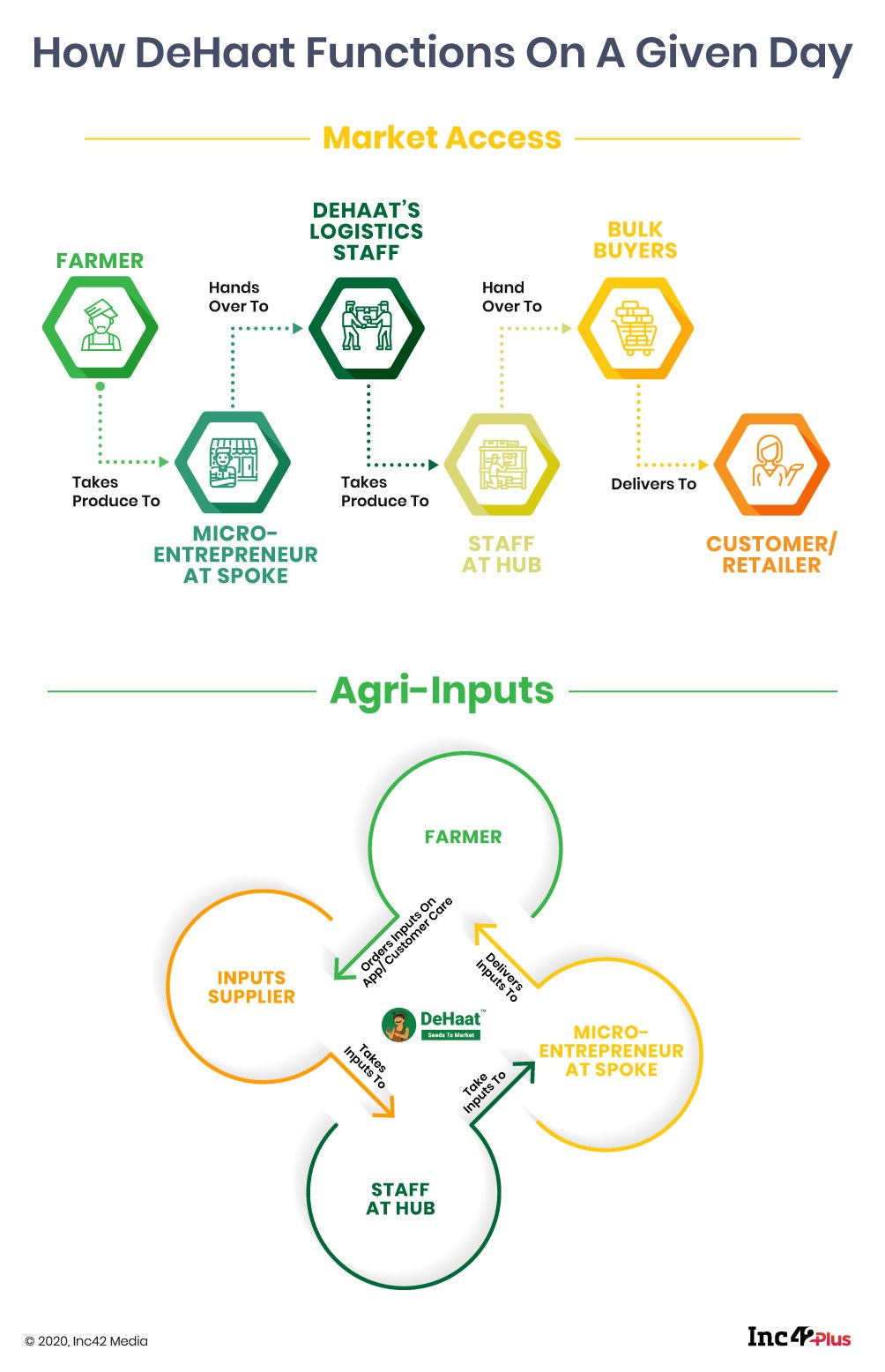
The startup currently has 1,362 micro-entrepreneurs, each managing one DeHaat centre across 680K villages in Bihar, Uttar Pradesh, Odisha, Jharkhand and West Bengal in a self-sustainable way. They are local villagers whom the farmers have known for years and they earn a commission of 3-7% on each delivery and output transaction.
“We onboard anyone with good knowledge of farming. But the minimum qualification is 12th pass and the person should be able to use a smartphone. It is a win-win situation for all,” says Kumar, adding that each micro-entrepreneur earns INR 20-25K every month.
Besides managing the hubs, DeHaat helps set up every spoke and oversees its daily operations. Each micro-entrepreneur has to contribute working capital worth INR 3-5 Lakh and also bear recurring expenses such as electricity and water charges. Additionally, DeHaat has developed a full-fledged practice to train these entrepreneurs. A 20-member team coordinates and trains them regularly.
The startup also claims that its micro-entrepreneurship model will help resolve India’s rural-to-urban migration in search of livelihoods. Kumar shares the story of a landless farmer to drive home the point. Thirty-two-year-old Dilip Kumar from Bettiah in Bihar has a family of six and wanted to migrate to the city as his income shrank. But based on his extensive farming knowledge, DeHaat decided to onboard him as a micro-entrepreneur in 2018. Today, Dilip serves 644 farmers and around INR 22,500 a month, claims the cofounder.
According to him, these micro-entrepreneurs bring efficiency to the supply chain.
“With small farmers, though the ticket size or transaction value is small, the number of transactions is high. However, most reliable channels for input and output are quite far from the villages, making it inaccessible for farmers. Through our last-mile networks supported by micro-entrepreneurs, we are trying to bring everything under one roof, and close to the farmers,” says the cofounder.
As of now, DeHaat is onboarding 15-20 entrepreneurs every month and 99% of input orders are delivered within 24 hours of ordering.
What Happens At The Backend: DeHaat’s Phygital Model
DeHaat follows a phygital model by leveraging tech and also using the last-mile network. Farmers can place their orders for agri-inputs via DeHaat’s helpline or an app developed by the company in Hindi. While 12-15% of the farmers use the app, and the rest uses the customer care service.
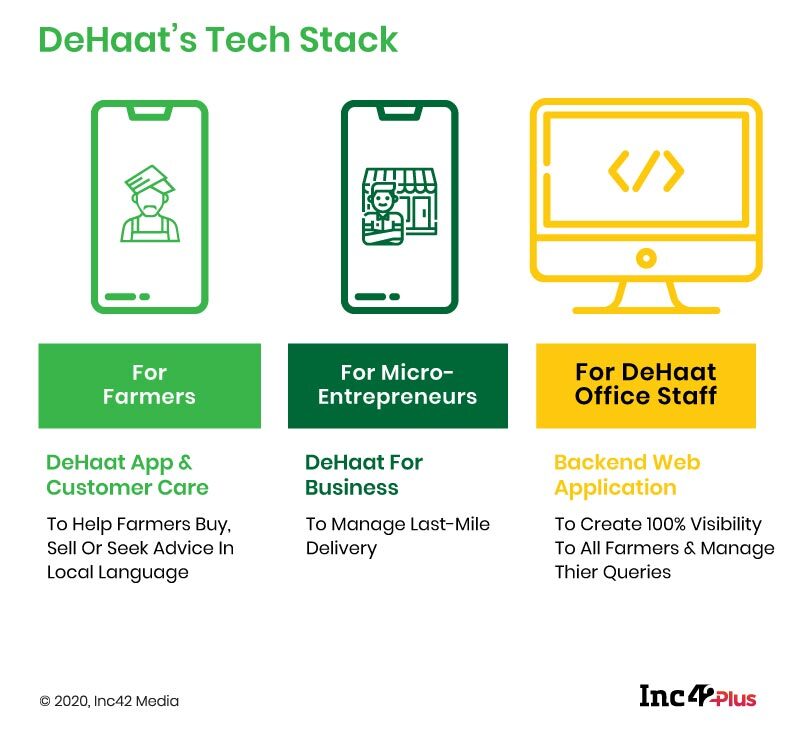
These orders are tracked by micro-entrepreneurs who use the DeHaat for business app to aggregate all input demands and deliver the same on the same day. The business app is also used to aggregate the farm produce.
“It is a simple interface. Micro-entrepreneurs will know what exactly to do on a given day. They will know if there is any pending order to be fulfilled and how much they have to aggregate,” says Kumar.
The business app also helps them note down farm-level queries and inform the same to DeHaat’s technical team in real time.
Interestingly, the company has developed a database for all prevailing crops and crop-related pests. “Using artificial intelligence and machine learning-based technology and staying in touch with the farmers throughout the year, we have developed an exhaustive crop database and tracking mechanism which helps in crop selection, irrigation, pest control and harvesting schedule,” explains Kumar. As technology is deployed at all levels, including farmers, micro-entrepreneur and the backend team, it gives us 100% visibility into the entire value chain in real time, he adds.
The efficient system of data collection in real time has further helped the company add a bouquet of financial services to its platform. For instance, using a combination of current transactions between DeHaat and the farmers and the database created over the years, the startup has developed a rating mechanism for farmers that can be used to avail credit.
The Race Is On To Become Full-Stack Service Platforms
DeHaat has always aimed to become a one-stop destination for farmers, helping them with crop selection, how to grow it and where to sell it. But quite a few agritech startups are also aiming to enter the fray in spite of considerable entry barriers. Of course, most of the late-stage startups such as WayCool, Ninjacart and MeraKisan are now operating in the market-linkage segment. And growth-stage companies like CropIn, mostly into precision farming or market linkage, are also scaling up fast. For the rest, though, adding multiple services is the way to grow and expand.
“As we work closely with farmers on the upstream, we have key data that helps us connect the right farmers to the right market-linkage startups. We can provide multiple services,” says Sateesh Nukala, CEO and cofounder of BigHaat, which sells agricultural products and machinery online and provides farm advisory.
Another agritech startup that believes in a full-stack solution is Villgro Innovation Fund-backed Krishihub, which operates an end-to-end supply chain for fresh produce and also offers farm advisory. According to the company, it is imperative to build a holistic model to solve the problems of Indian farmers at the grassroots, and this is where a full-stack agri ecosystem comes in.
Venture capitalists also show a keen interest in full-stack platforms.
“When you build multiple services – for instance, you provide inputs and buy from farmers – it builds stickiness. So, I see that the players who have been operating in the agri-inputs side are now either building their networks or collaborating with others to build a full-stack ecosystem,” says Hemendra Mathur, venture partner at Bharat Innovation Fund.
Adding critical layers beyond just input or output will also help startups scale faster by keeping the unit economics right, he notes.
Building a full-stack service platform for farmers is not an easy job, though. “It is both difficult and expensive; so it is certainly not appropriate for all agritech startups. But the advantage of the full-stack approach is that you can create holistic value for farmers across inputs, market linkages for outputs, fintech, advisory and other services. You do not have to maximise monetisation in any one area. And farmers certainly appreciate an end-to-end solution for the challenges they face,” says Mark Kahn, managing partner at Omnivore.
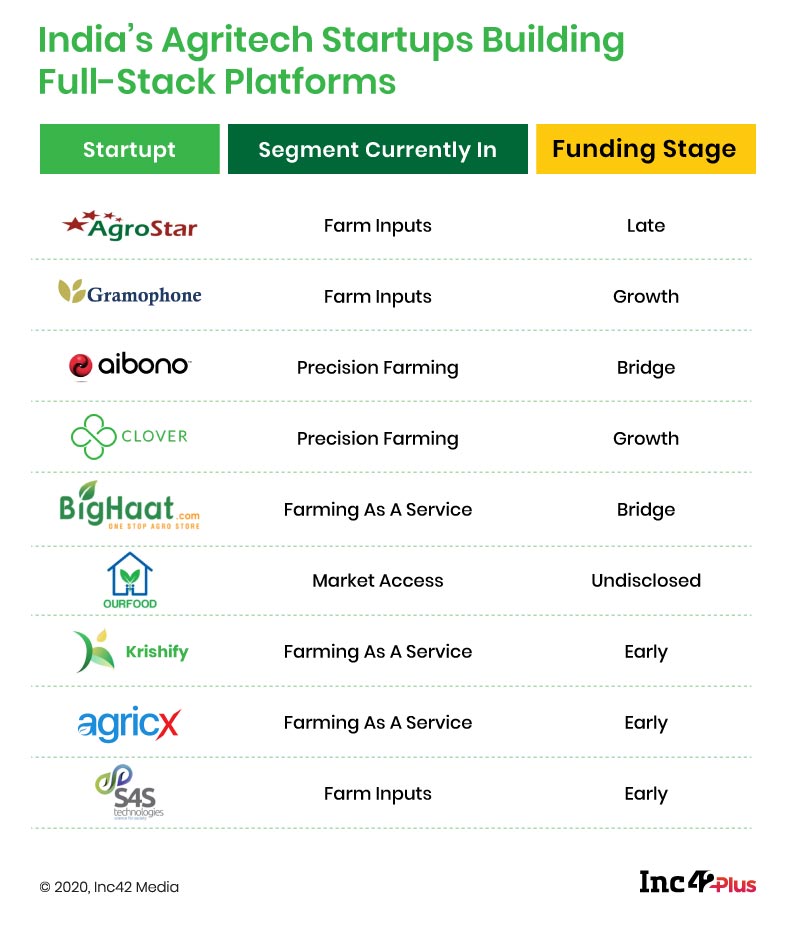
This is where DeHaat seems to have a well-rounded system in place, thanks to its efficient and accountable last-mile networks. In fact, early-stage startups such as Agrix and Anveshan are learning from DeHaat’s business model. “We believe it is essential to have a physical presence in a village. That is how you can build trust. Right now, farmers think that city people come in with some technology and then vanish (when help is required). That is why we are trying to be physically accessible to every farmer through our local representatives,” says Nilay Pandey, cofounder of Agrix. This early-stage agritech startup that provides farming as a service (FaaS).
The Competitive Edge And Revenue Model
“We think DeHaat’s USP is the value it creates for the farmers on the platform, but the micro-entrepreneur model is critical to helping the company scale quickly and connect with farmers in-person across rural India,” says Kahn of Omnivore.
Does it tally with DeHaat’s claims and outcomes?
The startup promises a 15-20% yield improvement if farmers buy all essential inputs and an increase of 5-10% in output pricing. “Farmers experience more than 50% increment in their net income from agriculture,” says Kumar.
Besides creating value for the farmers, keeping the unit economics right is the biggest challenge for agritech startups. DeHaat claims that 69% of its overall revenue comes from the sale of farm produce to institutions, 30% from the sale of agri inputs to farmers and 1% from financing services. “Our advisory services are very efficient, but we do not charge farmers for advisory. Whenever there is a transaction, say, when a farmer buys fertiliser, we make money,” says Kumar.
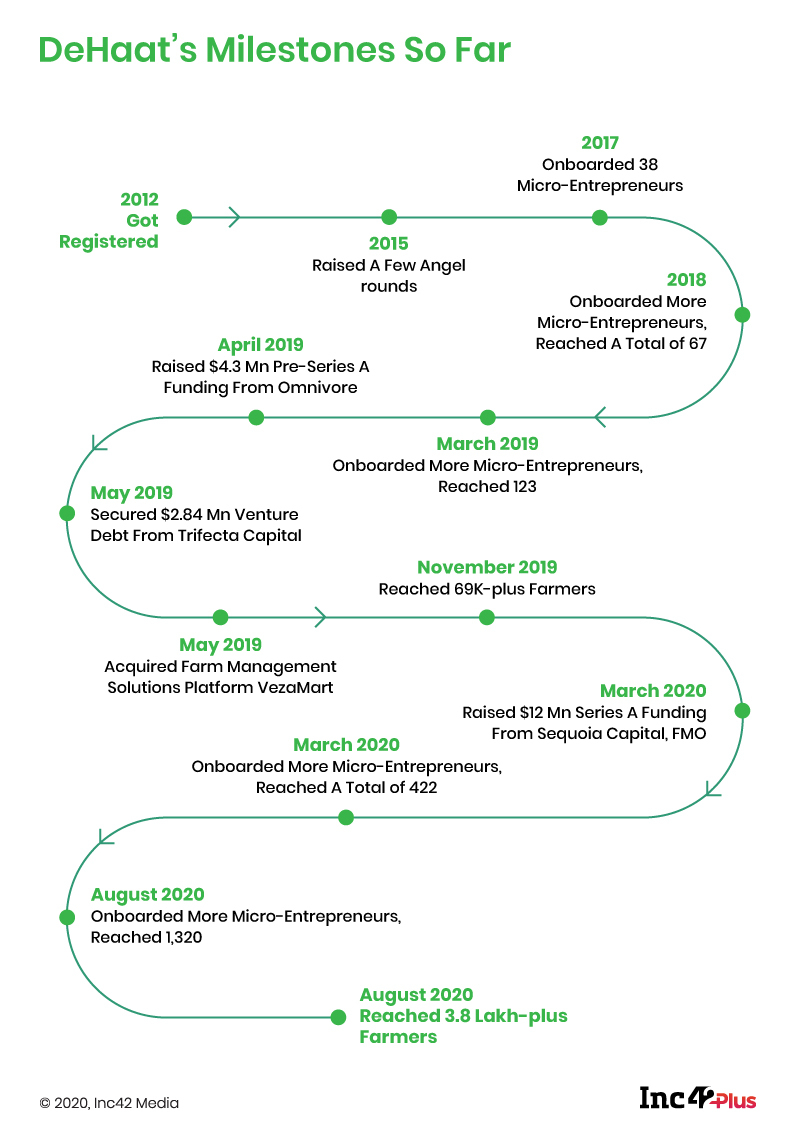
Interestingly, DeHaat follows a buy-and-sell model where it makes a markup. “We cannot disclose the profit margins, but what I can say is that our overall unit economics is very healthy. We have a cost-effective last-mile network without any fixed cost,” says Kumar. The startup handles 560-600 tonnes of produce every day and delivers 6,500-7,000 input orders.
Kumar claims that not even a single transaction has a negative contribution margin. On the fixed cost side, each DeHaat hub breaks even in 17-18 months. “We have a 4x annual growth rate,” he claims.
The startup deals with a wide range of agri produce such as maize, wheat, paddy, soya, fruits and vegetables, which further helps it scale. “For bulk buyers, we also provide customisation. The network we have created increases the scope of customisation. For instance, for potatoes, we pack three varieties based on humidity levels,” says Kumar.
Mathur of Bharat Innovation Fund also thinks expansion is easier through micro-entrepreneurs, not only in terms of multiple services but also in terms of crop variety. “Agriculture is the most complex and varied segment. Services and crops differ from region to region. So, the challenge lies in standardisation. With good training and screening in place, DeHaat can achieve that.”
It is one of the key reasons why DeHaat continues to follow the micro-entrepreneur model in spite of deeper digital penetration and greater adoption of smartphones by farmers. “Smartphone adoption is higher now. Still, we want to continue with this micro-entrepreneur approach. With this system in place, we are also creating our presence at rural retail levels. When farmers see physical centres and also see an app and a call centre for everything else, it builds trust,” says Kumar.
Besides, this model has helped DeHaat manage delivery and aggregation effectively.
“We believe it is not possible to deliver small input orders at the village level. But micro-entrepreneurs are working efficiently and getting the orders delivered in 24 hours, to many houses which do not even have delivery addresses or house numbers,” sums up Kumar.



